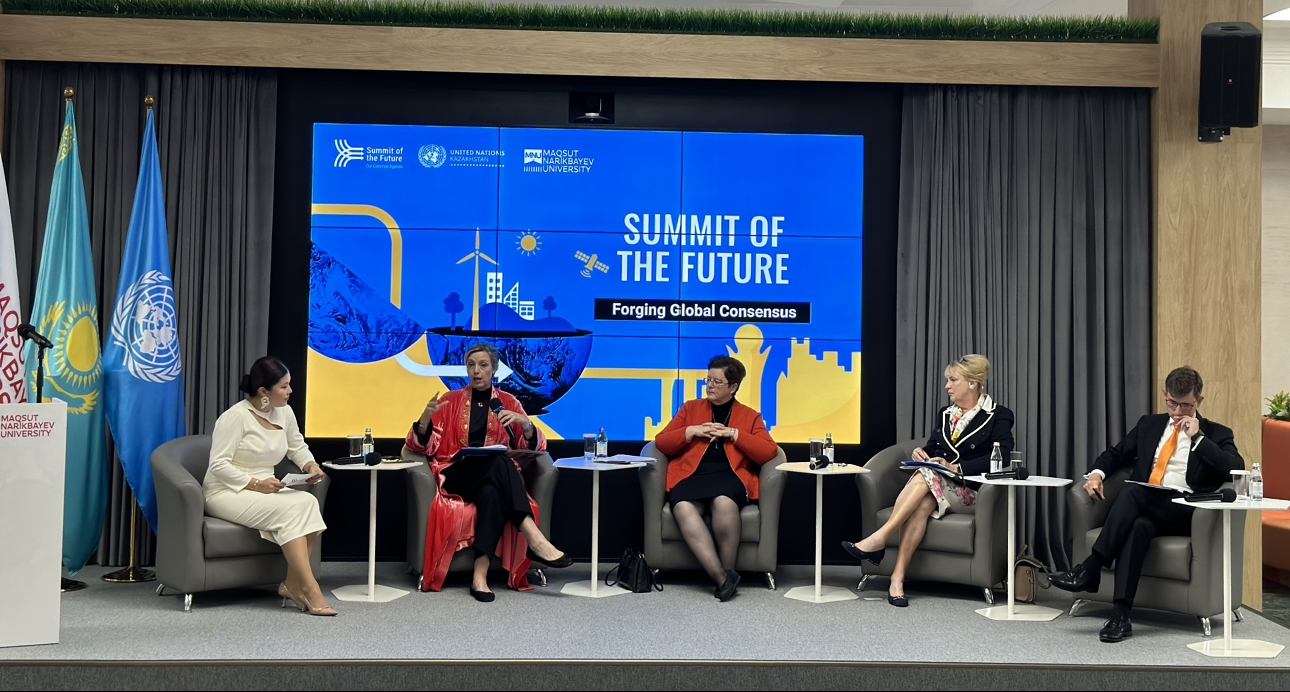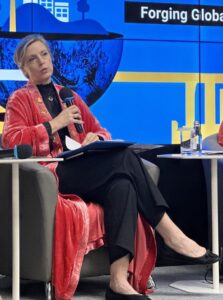ASTANA — In anticipation of the upcoming Summit of the Future, scheduled for Sept. 22-23 in New York, UN Resident Coordinator in Kazakhstan Michaela Friberg-Storey, along with distinguished Ambassadors from Germany, the Netherlands, and Sweden to Kazakhstan, convened to discuss the upcoming summit and the pivotal documents to be adopted, on Sept. 10 at Narikbayev University.

UN Resident Coordinator in Kazakhstan Friberg-Storey, Germany’s Ambassador Iwersen, Swedish Ambassador Polano and Netherlands’ Ambassador Schermers on Sept. 10 at Narikbayev University. Photo credit: The Astana Times
UN Perspective
Michaela Friberg-Storey emphasized the urgency of the summit, highlighting current global realities such as the Sustainable Development Goals (SDGs), where progress has been made on only 17% of indicators, despite the 2030 deadline drawing closer. This critical juncture, she noted, underscores a pivotal choice between a breakthrough or breakdown in global peace, security and development.

Michaela Friberg-Storey. Photo credit: The Astana Times
She also highlighted that one of the topics of the upcoming summit will focus on digitization, which offers unparalleled opportunities while bearing significant risks. Friberg-Storey noted that in Kazakhstan, despite significant strides in digital governance—ranked 28th globally—the digital divide persists, particularly affecting remote communities and schools lacking high-speed internet access. She mentioned initiatives like UNICEF’s Giga program, which aims to bridge this gap globally, ensuring equitable access to digital resources for education and healthcare.
The summit will focus on advancing sustainable development goals, strengthening international peace and security frameworks, and revitalizing multilateralism. Discussions will advocate for a renewed collective security system that addresses emerging threats, from cyber warfare to nuclear proliferation. The Secretary General’s new agenda for peace calls for reforming the Security Council to reflect contemporary global realities fairer and enhance multilateral cooperation.
Kazakhstan champions balanced approaches
“It is remarkable to see how countries like Kazakhstan have truly embraced multilateralism since gaining independence, not only through the UN but also through other multilateral platforms. Be it the OSCE, Conference on Interaction and Confidence Building Measures in Asia (CICA)j, or the Organization for Turkic States, Kazakhstan anchors itself in dialogue between states, which is key for continued peace and security,” she said.
The UN Resident Coordinator in Kazakhstan also noted that the summit will focus on reducing poverty. According to her, current trends indicate that 590 million people may still live in extreme poverty by 2030. She praised Kazakhstan’s efforts in poverty reduction.
“Kazakhstan has made tremendous progress in reducing poverty over the past 30 years. In 2001, some 46% of the population lived in poverty. Today, that figure stands at 5.2%, a tremendous reduction and one of the fastest globally,” she said.
Looking ahead, the summit anticipates producing pivotal documents reflecting commitments toward a more inclusive, sustainable future. Each country brings unique contributions to different documents – Germany with The Pact for the Future, Sweden with The Global Digital Compact, and the Netherlands with The Declaration on Future Generations.
The Pact for the Future
The Ambassador of Germany to Kazakhstan, Monika Iwersen, highlighted that Germany and Namibia have co-facilitated negotiations on the document for two years. According to Iwersen, the goal is to create a “meaningful, substantial and action-oriented” document that strengthens multilateralism and reinforces the UN’s critical institution for global peace, security and development. She said, “The UN remains central to solving global problems.”
The document aims to address global issues such as polarization, challenges to human rights, the unequal distribution of resources and systemic rivalries. Iwersen noted that current international systems, such as the UN Security Council, are under strain due to these factors, highlighting a need for reform to “make the United Nations fit for the future.”
The Global Digital Compact
In her speech, Swedish Ambassador to Kazakhstan Ewa Polano highlighted the document’s significance within Sweden’s foreign policy and the international community. She emphasized Sweden’s dedication to multilateralism, peace and international cooperation, particularly in response to challenges such as AI governance, cybersecurity and the digital divide.
Polano noted that her country has long been committed to peace, neutrality and multilateral initiatives. Nevertheless, the changing geopolitical landscape, particularly after the Russia-Ukraine conflict, prompted Sweden to join NATO.
The Swedish ambassador also stressed the urgency of the Global Digital Compact, which seeks to regulate technology’s rapid evolution and ensure its positive use in society. Polano warned about the dangers of AI-generated content, stating, “We are already witnessing how AI-generated images and videos contribute to societal mistrust.”
According to Polano, Kazakhstan is a vital partner in these efforts, being highly advanced in digitalization.
The Declaration on Future Generations
Ambassador Nicolaas Schermers of the Netherlands discussed his country’s role in co-facilitating the declaration alongside Jamaica. He stressed that the declaration aims to translate the promises made to future generations into tangible actions, stating that “it is time that we turn the promises we made to future generations into reality.”
This declaration addresses how the world’s current actions will impact those yet to be born, sparking significant debate within the Netherlands about whether future generations could have rights, given that they do not yet exist.
“But this is not about us. This is about future generations, so they don’t have rights. They only have needs and interests. That is why the declaration speaks about needs and interests. It is also the first time that we are discussing policy about generations that do not exist,” he explained, providing a glimpse into the complexity of the discussion.
Schermers also drew parallels between this initiative and the Netherlands’ response to the 1953 flood disaster, when the country launched the Delta Plan to protect future generations. This example, he noted, illustrates the foresight and responsibility today’s leaders must demonstrate for future generations.
Schermers further connected this global initiative to Kazakhstan, referencing President Kasym-Jomart Tokayev’s recent address, which emphasized cultural changes to secure a better future for generations to come.
“I think it was also evident in the opening of the World Nomad Games, if you’ve been watching it. In the end, there was a very nice performance on the environment and the climate, and I think that part made the biggest impression on me,” he said.
Schermers said that the Netherlands has long been a steadfast proponent of international law, a stance deeply rooted in its history.
“We claim to have invented international law,” Schermers joked, referring to the nation’s pioneering role in shaping global legal systems.
According to him, much like Kazakhstan today, the country was historically wedged between major powers. In response, it developed a system of diplomacy and dialogue rather than conflict, recognizing that outright confrontation would be disastrous.
The upcoming summit is expected to yield documents of significant impact, comparable to the Paris Climate Agreement and the Universal Declaration of Human Rights, with contributions from countries such as Germany, Sweden, and the Netherlands to various key documents.
